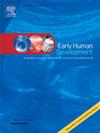父母对4个月和18个月早产儿进行感觉运动干预的纵向结果。
IF 2
3区 医学
Q2 OBSTETRICS & GYNECOLOGY
引用次数: 0
摘要
目的:尽管人们越来越关注新生儿重症监护病房的早期父母分娩干预措施,以促进婴儿发育,但关于这种干预措施对早产儿的持续益处,研究仍存在空白。本研究评估了父母给予的感觉运动干预(PASI)对先前参加随机临床试验(RCT)的婴儿发育结局的影响。方法:采用4个月和18个月修正胎龄(CGA)的RCT进行前瞻性纵向随访研究。一名盲法审查员进行了后续评估。研究结果包括两个时间点的发育结果和儿童18个月时与健康相关的生活质量,使用各种手段:婴儿运动表现测试(TIMP)、喂养和发育里程碑问卷(FDM)、严重神经障碍诊断、婴儿发育量表(IDI)和儿童生活质量量表(PedsQL)。结果:4个月时,47名婴儿参加了随访,实验组接受直接母乳喂养的婴儿多于对照组(38%比12%,p = 0.032)。在出生年龄18个月时,对51名婴儿进行了随访,结果显示两组之间在发育结局或健康相关生活质量方面没有显著差异。然而,与实验组相比,对照组中更多的父母报告了对孩子发育的担忧。结论:PASI似乎对婴儿的母乳喂养结果和父母对发育问题的看法有持久的积极影响。这些发现强调了早期产后经历对早产儿长期发育轨迹影响的重要性。本文章由计算机程序翻译,如有差异,请以英文原文为准。
Longitudinal outcomes of a parent-administered sensorimotor intervention in preterm infants at 4 and 18 months
Purpose
Despite the increasing focus on early parent-delivered interventions in neonatal intensive care units to enhance infant development, there remains a research gap concerning the sustained benefits of such interventions in preterm infants. This study evaluated the impact of the parent-administered sensorimotor intervention (PASI) on developmental outcomes of infants previously enrolled in a randomized clinical trial (RCT).
Method
A prospective longitudinal follow-up study following the RCT at 4 and 18 months corrected gestational age (CGA) was conducted. A blinded examiner conducted the follow-up assessments. The study outcomes developmental outcome at both time points and the child's health-related quality of life at 18 months CGA using various means: Test of Infant Motor Performance (TIMP), the Feeding and Developmental Milestone Questionnaire (FDM), diagnosis of severe neurological disorder, the Infant Development Inventory (IDI) and Pediatric Quality of Life Inventory (PedsQL).
Results
At 4 months CGA, 47 infants participated in the follow-up, with more infants in the experimental group receiving direct breastfeeds compared to the control group (38 % vs. 12 %, p = 0.032). At 18 months CGA, 51 infants were followed, showing no significant differences in developmental outcomes or health-related quality of life between groups. However, more parents in the control group reported developmental concerns about their child compared to those in the experimental group.
Conclusion
The PASI appears to have lasting positive effects on breastfeeding outcomes for infants and on parents' perceptions of developmental concerns. These findings underscore the importance of early postnatal experiences in influencing the long-term developmental trajectories of infants born preterm.
求助全文
通过发布文献求助,成功后即可免费获取论文全文。
去求助
来源期刊

Early human development
医学-妇产科学
CiteScore
4.40
自引率
4.00%
发文量
100
审稿时长
46 days
期刊介绍:
Established as an authoritative, highly cited voice on early human development, Early Human Development provides a unique opportunity for researchers and clinicians to bridge the communication gap between disciplines. Creating a forum for the productive exchange of ideas concerning early human growth and development, the journal publishes original research and clinical papers with particular emphasis on the continuum between fetal life and the perinatal period; aspects of postnatal growth influenced by early events; and the safeguarding of the quality of human survival.
The first comprehensive and interdisciplinary journal in this area of growing importance, Early Human Development offers pertinent contributions to the following subject areas:
Fetology; perinatology; pediatrics; growth and development; obstetrics; reproduction and fertility; epidemiology; behavioural sciences; nutrition and metabolism; teratology; neurology; brain biology; developmental psychology and screening.
 求助内容:
求助内容: 应助结果提醒方式:
应助结果提醒方式:


